- Home
- Raymond Chandler
The Raymond Chandler Papers: Selected Letters and Nonfiction, 1909–1959
The Raymond Chandler Papers: Selected Letters and Nonfiction, 1909–1959 Read online
The Raymond Chandler Papers
The Raymond Chandler Papers
Selected Letters and Nonfiction, 1909–1959
RAYMOND CHANDLER
Edited by Tom Hiney and Frank MacShane
GROVE PRESS
New York
Contents copyright © 2000 by the Estate of Raymond Chandler
Introduction copyright © 2000 by Tom Hiney
Editorial arrangement copyright © 2000 by Tom Hiney and Frank MacShane
All rights reserved. No part of this book may be reproduced in any form or by any electronic or mechanical means, including information storage and retrieval systems, without permission in writing from the publisher, except by a reviewer, who may quote brief passages in a review. Any members of educational institutions wishing to photocopy part or all of the work for classroom use, or publishers who would like to obtain permission to include the work in an anthology, should send their inquiries to Grove/Atlantic, Inc., 841 Broadway, New York, NY 10003.
First published in the United Kingdom in 2000 by Hamish Hamilton Ltd., an imprint of the Penguin Group
Published simultaneously in Canada
Printed in the United States of America
FIRST GROVE PRESS EDITION
Library of Congress Cataloging-in-Publication Data
Chandler, Raymond, 1888-1959.
The Raymond Chandler papers : selected letters and nonfiction, 1909–1959 / Raymond Chandler; edited by Tom Hiney and Frank MacShane.
p. cm.
Includes index.
ISBN 9780802194336
1. Chandler, Raymond, 1888-1959—Correspondence. 2. Authors, American—20th century—Correspondence. 3. Detective and mystery stories—Authorship. I. Hiney, Tom, 1970–II. MacShane, Frank. III. Title.
PS3505.H3224 Z48 2001
813’.52—dc21
[B]00-054314
Grove Press
841 Broadway
New York, NY 10003
02 03 04 05 0610 9 8 7 6 5 4 3 2 1
Contents
Introduction
Act I (1909–1912)
Act II (1918–1943)
Act III (1944–1946)
Act IV (1946–1954)
Act V (1954–1959)
Index
Introduction
‘In a general way I am completely disgusted with the anthology racket. People who have given nothing to the world in the way of writing (and never will) presume to use other men's work at nominal, and by God I mean nominal, prices, for their own benefit and profit and to justify themselves as editors or critics or connoisseurs, in furtherance of which they write pukey little introductions and sit back with an indulgent smile and all nine pockets open.’
Raymond Chandler to a publisher, 24 November 1946
Six years ago, I began work on a biography of Raymond Chandler. In so doing, it quickly became clear to me that the best source of material concerning the subject was that written by Chandler himself. This was in part by virtue of necessity. He had been a reclusive man, who had left no wife or children after his death in 1959. Nor were there any brothers or sisters; or even second cousins. He had been an only child and a childless man, and, clocking up over 100 addresses in the course of his life, rootless. The man Time magazine once described as ‘the poet laureate of the loner’ appeared to be the genuine article. ‘To know me in the flesh,’ he warned one correspondent, ‘is to pass on to better things.’
But while he may have been a recluse, Chandler was a compulsive letter-writer; and here lay many clues to the man behind Philip Marlowe. The surviving carbons of his letters are divided between a large collection at the Bodleian Library in Oxford and one at the University of California at Los Angeles. In those letters, of which thousands have survived, Chandler talks openly about life, writing and modern Californian society. Many of the letters included here were written late at night, spoken into a Dictaphone for his Mexican secretary Juanita Messick to type up in the morning. He was often drinking when he dictated them, and they serve as an unusually honest and freewheeling journey into the mind of a man who had seen a lot, read a lot, drunk a lot, thought a lot and steered perilously close to insanity in the process. He was as capable of fierce self-scrutiny as he was of antisocial virtuosity – no one, I came to believe, could be more perceptive or informative about Chandler than Raymond Chandler himself.
The letters lie firmly at the heart of his written legacy, and there have already been two selections since his death in 1959: Raymond Chandler Speaking in 1962 and The Selected Letters of Raymond Chandler in 1981. I am indebted to both here, and particularly to the work of the late Professor Frank MacShane. Frank MacShane died in 1998. His work on Chandler in the 1970s and 1980s helped to convince the intellectual powers-that-were that Raymond Chandler was more than just a whodunit writer, but in fact a modern Californian shaman and an American literary treasure – something his fans took for granted. MacShane's valiant work lives on in this selection and bases itself on his 1981 edition. I would also like to express my gratitude to the Chandler estate for having approached me to prepare this edition.
After spending a lot of time myself with the Chandler papers, I believe I have found some interesting new material. There is one main reason for this. The majority of Chandler's letters were to men and women he dealt with professionally: publishers, agents, lawyers. Most of these letters began with a matter of business at hand, and would then veer off into soliloquies concerning whatever fired Chandler's thoughts at that moment. Thus, for example, a letter to his accountant about tax matters might end up discussing cinema and chess (the latter described by Chandler as ‘the greatest waste of human intelligence outside an advertising agency'). In the midst of an argument with his European agent about Italian translation rights, Chandler might offer an insight into General MacArthur's performance in World War II. And so on. Realizing how much still remained embedded within the avalanche of his business correspondence (which could easily fill two large wardrobes), I decided to resurvey his correspondence, from start to finish. I was rewarded, as I had hoped, with some classic lost Chandler moments. Readers familiar with the two earlier selections of Chandler's letters will therefore find plenty of new moments to enjoy here. In addition to that retrieved from existing papers (including never previously seen journalism) several new letters have come to light in the last ten years – notably Chandler's two-year correspondence with a fan-turned-lover named Louise Loughner.
Raymond Chandler's letters and journalism are worth reading even by those not acquainted with his fiction. As the Washington Post's critic wrote in reviewing MacShane's selection in 1981, Chandler's letters are ‘compulsively readable’. At moments, in fact, they match the lucid heights of his fiction.
A potted sketch of Chandler's life will be useful for those not familiar with his story. For, in a century dominated by dislocation, Raymond Chandler had had a particularly unsettled background. Born in Chicago in 1888, he was the only child of an Irish-born mother and a Pennsylvania-born father. Both were lapsed Quakers, and his father was an alcoholic, whose job as a itinerant rail engineer meant Chandler saw little of him while growing up. Chandler and his mother spent his first years in a rented house in Chicago, then in a series of inexpensive hotel rooms, and increasingly with relatives in the prairies of Nebraska.
In 1895, Chandler and his mother, whose marriage was now over, sailed with their belongings for Ireland. There, they lived as outcasts amid the genteel Protestant community of Waterford in which Florence Chandler had grown up. The boy was later sent
to London, to live with his grandmother and – at the expense of an uncle – eventually to attend Dulwich College, a smart Victorian private school where he had to wear tails. The uncle was not prepared to pay for him to attend university, so removed Chandler from Dulwich a year early and sent him to tutorial colleges in France and Germany, in preparation for sitting the British Civil Service examination, a familiar recourse of well-spoken young men with no capital.
Following his year on the Continent, Chandler passed third out of 500 in the exams and began working in the British Admiralty, in the office of munitions. He disliked the job, and resigned after a few months. Over the next five years, he lived at an assortment of shabby addresses in London, earning a meagre living from writing for literary magazines. His uncle refusing to continue to subsidize his ward any longer, Chandler emigrated alone to America in 1912, the same year the Titanic sank. He had no money other than that borrowed (to be repaid, with interest) from his uncle. After jobs as a tennis racquet-stringer, fruit-picker and shop assistant, he eventually found work in Los Angeles as a junior accountant.
In 1917, Chandler journeyed north of the United States border in order to enlist with the Gordon Highlanders. Only the twentieth century could produce the scenario of an American-born Anglo-Irishman travelling to Canada in order to join a Scottish regiment to fight Germans in France. Chandler served in the ranks as a soldier, and rose to the rank of Sergeant. On his return to California (via Seattle) he married a twice-divorced ex-model and found work within the state's now booming oil industry. The Chandlers moved house constantly in and around Los Angeles over the next thirteen years and had no children. Possibly unbeknown to Chandler, his wife was seventeen years his senior, and had altered her birth date on their wedding certificate by ten years. After his sacking from the oil business for drunkenness in 1932, the couple continued their nomadism, though in shoddier suburban Angelino addresses. Chandler began to write for pulp crime magazines. In 1939, he completed and published his first full-length novel, The Big Sleep, introducing a hero-narrator called Philip Marlowe. Seven years later, having made his fortune via Hollywood, he settled and bought a luxurious house near San Diego. Both he and Philip Marlowe were by then famous, on screen and on the page.
Following his wife's death in 1954, Chandler lived out a lonely and manic end in European and southern Californian hotels. He had managed to sustain no real long-standing friends in his life, and he had no family. Only seventeen people attended his funeral in 1959, including a local representative of the American Mystery Writers’ Association.
Add the recurring demon of alcoholism to this story, and it is little surprise that Chandler once described it emotionally at least as ‘a rather forlorn sort of life’. It was sometimes more than forlorn: he made a drunken suicide attempt in 1955 that landed him a state psychiatric cell. But qualities other than desperation are often found on the boundaries of sanity, and Chandler held those in spades. The payback for a life of odd ends was the sort of raw wit that appears in print only once or twice a century. The sort of eye that can see straight through what people say to what they mean. Few writers of his own generation have dated so little. This is as true of his letters as it is of his novels and screen work, and this collection, I hope, will offer fresh testimony to that.
The material here includes not just letters, but other writing outside his novels and screenplays. It is presented chronologically. No correspondence from Chandler's early London adulthood survives, and I have instead included a few of his essays and poems which he wrote for literary magazines at that time. The letters themselves start in 1939, though it is from 1943 until his death in 1959 that most were written. He very rarely wrote fiction after dusk (he said he found efforts to do so too ‘ghoulish’ in result when read by daylight), and dark instead was when he wrote or dictated his letters. These are very much the chronicles of a midnight man, often spoken aloud as he sat up alone, electrified with an insomnia he had known since he was a young man.
As well as the letters never seen before here, other non-fiction pieces are resurrected for the first time, including an unpublished account of a fascinating meeting with the exiled gangster Lucky Luciano, held at a Naples hotel two years before Chandler's death. Also published for the first time since it appeared in print in 1948 is his memorable eye-witness description of that year's Oscar ceremony, a masterpiece of satire by a man on the cusp of retiring from Hollywood.
But like most great writers, Chandler's papers begin with some very bad poetry . . .
Tom Hiney
Republic of South Africa, March 2000
Act I (1909-1912)
Chandler's papers start with his first creative output – poems and essays – written in London shortly before the outbreak of World War I. Chandler was in his late teens and early twenties at the time, having finished his education at Dulwich College in south London, and a year learning German and French on the Continent. Several of his pieces found publication in three literary magazines of the day: the Westminster Gazette, the Academy and Chamber's Journal. Chandler lived, however, at the indulgence of a growingly impatient uncle. His career as a published writer ended in 1912, at the age of twenty-four, with his emigration to the United States of America. He would not write for publication for another twenty years, and then as a pulp crime writer. He later described his early poetry as ‘Grade B Georgian’.
’A Woman's Way’,
Westminster Gazette, 22 April 1909.
Come with me, love,
Across the world,
Ere glory fades
And wings are furled,
And we will wander hand in hand,
Like a boy and girl in a playroom land.
Stay with me love in the city's murk,
Where the sun but dares
Shyly to lurk,
And we will watch life hand in hand,
Like a boy and girl in a grown-up land.
Go from me, love,
If thou'lt not stay;
Follow thy bent,
‘Tis the better way.
And I will seem to hold thy hand,
Like a child in dreams of fairyland.
I must leave thee, love?
‘Tis I must go?
Then as thou wilt,
For thou must know.
Let me but think I hold thy hand,
I'll roam content in any land.
’Destiny’,
sent to the Westminster Gazette, never published.
When no more shadows veil the silent city,
And down the hunted way no phantoms go,
When no more kings are proud or ladies waiting,
And no more pale narcissus decks the row,
When all the sighs are hush'd and musics broken
Along the moon-dazed garden chill'd and grey,
When fades each bud that was a lover's token,
Shall our love wither too and pass away?
When all the lost are worn and lonely,
And all the tunes are dim and sad and old,
When all the burning dreams we dream are only
Dead leaves too dead to tremble in the cold,
When no more roses droop or lillies falter,
When all the useless hours are wept and [unreadable]
God and silence by the broken altar
Shall our love be a hollow in the night?
Chandler's reviews and sketches from this time, written for the same London journals, show more of the voice that was later to emerge.
’The Remarkable Hero’,
the Academy, 9 September 1911.
The time is not distant beyond the memory of living men when the hero of a typical novel had to be, if not a person of title, at any rate a man of tolerable family. If, in the days of his affluence, he did not possess a valet, or if when leaving home under a cloud he could not bestow his last sovereign on a head gardener, he was not likely to have many admirers. The snobbishness of those days was not greater than the snobbishness of these, b
ut it was far simpler and more straightforward. It demanded quite honestly, on behalf of the middle-class reader, to mix with its social betters. No doubt it was perfectly right; if a man cannot choose his company even in novels things are in a bad way. But, however that may be, the distinction of the hero of that time was on the side of birth and breeding. He might be compelled by circumstances to associate with coalheavers, but even when his coat was shiny at the elbows the cabmen called him ‘My lord’. When he told the landlady of his humble lodging that he had come into a marquisate and forty thousand a year, she always reminded him that she had known him at the first for a ‘real gent’. His brains might be of feeble quality – indeed they usually were – but his manners were of the best. He might not know how to counter the most childish plot, but he invariably knew what to do with his hands in a drawing-room, a problem which has puzzled more people than ever troubled about the riddles of life and death.
In these days, however, good breeding is usually left as a minor perquisite to the villain. The hero may, as far as his social position is concerned, be anybody. He may drop his aspirates, he may be a boor, he may be ignorant of the most elementary rules of polite behaviour. Common honesty is not in the least a necessity to him. If he is fiendishly ugly, his adventures are all the more piquant. He may even be deformed, and his Life will sell in tens of thousands. He may squint, he may be club-footed, he may wear ready-made clothes, he may smoke in church, he may shoot foxes, he may browbeat women and patronize old men, he may do any of those forbidden things, for doing the least of which we would cut our dearest friends, and yet he may charm voracious multitudes. We care nothing for his clothes, nor his manners nor his antecedents nor his actions; in these respects we are all tolerant. But there is one quality which we demand in him: he must be a remarkable person. It matters very little in what his fate lies, whether in art, finance, sport, politics, exploration, swindling, or throat-cutting, but his intellect must be of the cast of great men.

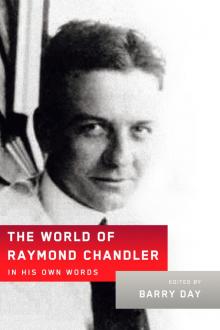 The World of Raymond Chandler: In His Own Words
The World of Raymond Chandler: In His Own Words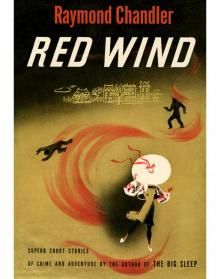 Red Wind: A Collection of Short Stories
Red Wind: A Collection of Short Stories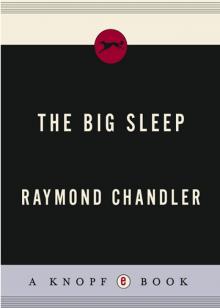 The Big Sleep
The Big Sleep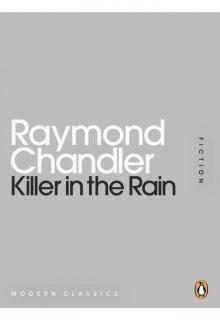 Killer in the Rain
Killer in the Rain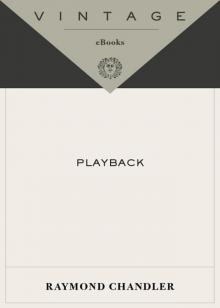 Playback
Playback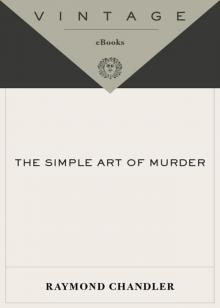 The Simple Art of Murder
The Simple Art of Murder The Bronze Door
The Bronze Door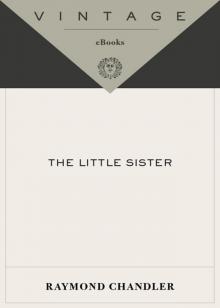 The Little Sister
The Little Sister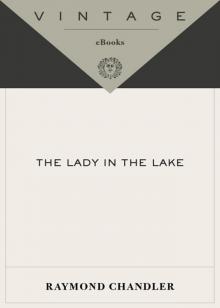 The Lady in the Lake
The Lady in the Lake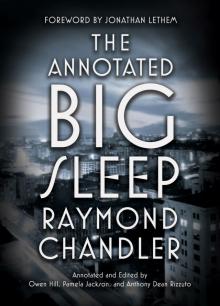 The Annotated Big Sleep
The Annotated Big Sleep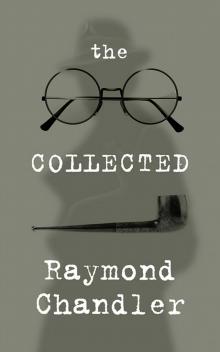 The Collected Raymond Chandler
The Collected Raymond Chandler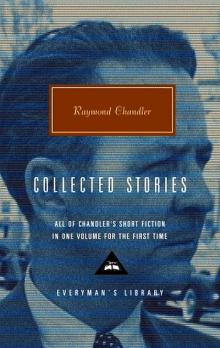 Collected Stories (Everyman's Library)
Collected Stories (Everyman's Library)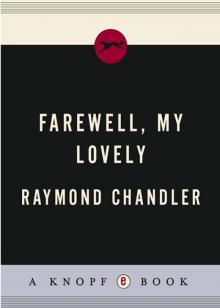 Farewell, My Lovely
Farewell, My Lovely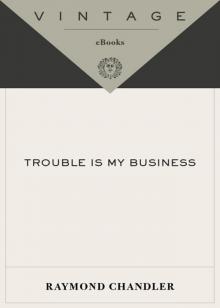 Trouble Is My Business
Trouble Is My Business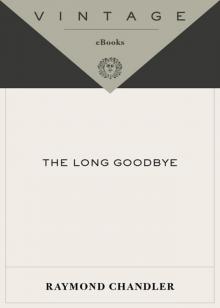 The Long Goodbye
The Long Goodbye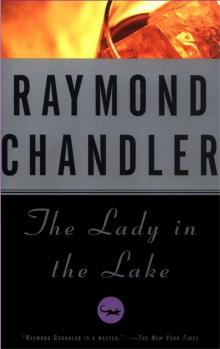 The Lady in the Lake pm-4
The Lady in the Lake pm-4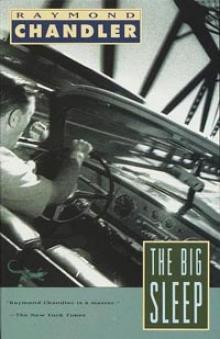 The Big Sleep pm-1
The Big Sleep pm-1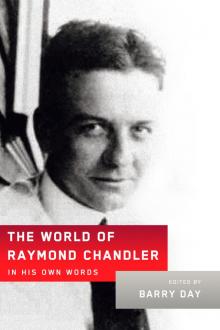 The World of Raymond Chandler
The World of Raymond Chandler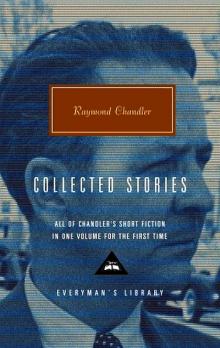 Collected Stories of Raymond Chandler
Collected Stories of Raymond Chandler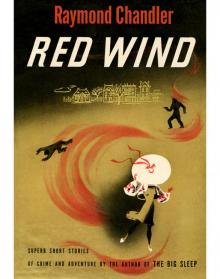 Red Wind
Red Wind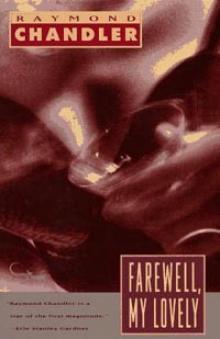 Farewell, My Lovely pm-2
Farewell, My Lovely pm-2 The Raymond Chandler Papers: Selected Letters and Nonfiction, 1909–1959
The Raymond Chandler Papers: Selected Letters and Nonfiction, 1909–1959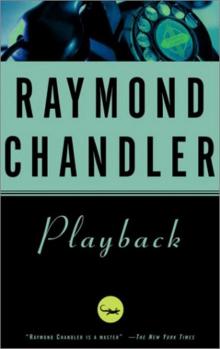 Playback pm-7
Playback pm-7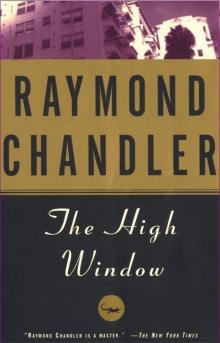 The High Window pm-3
The High Window pm-3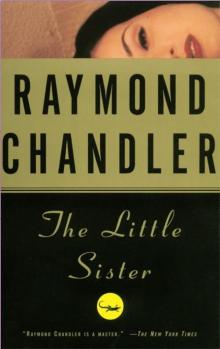 The Little Sister pm-5
The Little Sister pm-5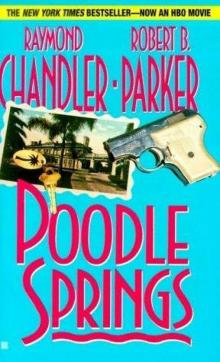 Poodle Springs (philip marlowe)
Poodle Springs (philip marlowe)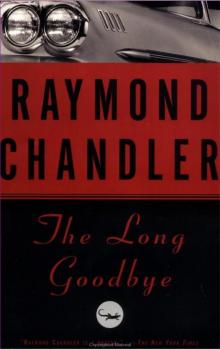 The Long Goodbye pm-6
The Long Goodbye pm-6